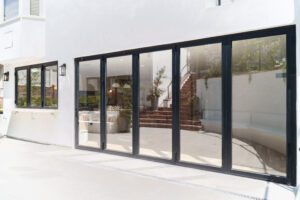Introduction: Choosing the Right Material for Your Lifestyle
When it comes to upgrading your home with bifold doors, the material you choose is just as important as the style. Two of the most popular options today are aluminum and vinyl, each offering distinct advantages.
Deciding between aluminum vs vinyl bi-fold doors isn’t simply about appearance — it’s about durability, insulation, maintenance, and long-term value.
At Eris Home Products, we guide homeowners through this choice with the understanding that the right door material shapes not only your home but also your daily living experience.
Durability: Strength That Lasts
Durability is one of the most significant differences between aluminum and vinyl in a bifold material comparison.
- Aluminum Bi-Fold Doors: Known for exceptional strength, aluminum frames are slim yet capable of supporting large glass panels. They resist warping, swelling, and cracking, making them suitable for nearly any climate. With proper care, they can last decades without losing structural integrity.
- Vinyl Bi-Fold Doors: Vinyl frames are more affordable but less robust. Over time, they may become brittle, warp in extreme heat, or crack in cold conditions. While improved manufacturing has made vinyl stronger than in the past, it still doesn’t match the resilience of aluminum.
If longevity is your priority, aluminum offers unmatched confidence in performance.
Both materials are designed to withstand the outdoors, but performance varies with climate.
- Aluminum: Performs consistently in all weather, resisting rain, wind, and UV rays. With protective coatings, aluminum doesn’t rust or fade, even in coastal environments.
- Vinyl: Provides good resistance in mild climates but struggles under extreme conditions. Prolonged exposure to strong sun or heavy storms can shorten its lifespan.
Think of aluminum as a weatherproof shield — strong and reliable — while vinyl works best as a lighter option for stable climates.
Insulation and Energy Efficiency
A major concern for homeowners today is energy performance. Insulated doors keep homes comfortable and reduce energy bills.
- Aluminum Bi-Fold Doors: Modern versions feature thermal breaks and advanced glazing that significantly improve efficiency. With the right glass, aluminum doors can meet or exceed energy code requirements.
- Vinyl Bi-Fold Doors: Vinyl is naturally insulating, which gives it an advantage in basic thermal performance. However, its weaker structure often requires thicker frames, limiting the glass area.
When comparing energy-efficient doors, vinyl may offer affordability in mild climates, but aluminum achieves both efficiency and design flexibility, especially with high-performance glazing.
Aesthetics: Style That Defines Spaces
Design appeal is often the deciding factor, and the two materials create very different looks.
- Aluminum: Offers slim frames and modern finishes that maximize glass area and natural light. Available in matte, metallic, or custom colors, aluminum frames complement contemporary design trends.
- Vinyl: Typically bulkier frames with fewer color choices. While vinyl can imitate wood grains, its design flexibility is more limited.
If you value minimalist lines and panoramic views, aluminum creates a timeless, high-end aesthetic that vinyl cannot fully replicate.
Maintenance: Effort vs. Ease
Homeowners often underestimate the value of easy upkeep.
- Aluminum: Requires very little maintenance — just occasional cleaning with mild soap and water. Protective coatings ensure color and finish last for years.
- Vinyl: Also low-maintenance but prone to staining, scratching, or discoloration over time. It cannot always be refinished, so damaged sections may require full replacement.
Both are easier than wood, but aluminum ensures a longer-lasting finish with minimal effort.
Cost Difference: Upfront vs. Long-Term Value
Budget plays a key role in any decision.
- Vinyl Bi-Fold Doors: More affordable upfront, making them attractive for budget-conscious projects.
- Aluminum Bi-Fold Doors: Higher initial investment, but longer lifespan, stronger performance, and better resale value make them more cost-effective over time.
It’s the classic balance: vinyl saves money today, while aluminum saves money tomorrow.
When to Choose Aluminum vs Vinyl Bi-Fold Doors
- Choose Aluminum: If you live in a harsh climate, want slim modern frames, or value long-term durability and resale value.
- Choose Vinyl: If you live in a mild climate, need a budget-friendly option, and prefer low upfront costs.
The choice ultimately depends on whether you prioritize immediate savings or long-term performance.
Conclusion: Matching Doors to Your Vision
The decision between aluminum vs vinyl bi-fold doors comes down to lifestyle, climate, and priorities. Aluminum excels in durability, aesthetics, and long-term value, making it ideal for homeowners seeking strength and modern elegance.
Vinyl offers affordability and natural insulation but may not provide the same resilience or design impact.
At Eris Home Products, we help homeowners find the perfect balance between beauty, performance, and cost. Whether you choose the enduring strength of aluminum or the practical appeal of vinyl, your doors should reflect your vision of comfort and style.
Discover the possibilities with Eris Home Products and let your bifold doors define your home’s future.
FAQ
1. What are the main differences between aluminum and vinyl bi-fold doors?
Aluminum bi-fold doors are known for their strength, durability, and sleek modern look, while vinyl bi-fold doors offer better insulation, affordability, and low maintenance. Aluminum suits contemporary designs, whereas vinyl fits homeowners seeking energy efficiency and cost savings.
2. Which material is more energy-efficient — aluminum or vinyl?
Vinyl bi-fold doors are generally more energy-efficient because vinyl is a natural insulator that reduces heat transfer. Aluminum can also be efficient if it includes a thermal break (an insulated barrier within the frame) to minimize heat loss.
3. How do maintenance requirements differ between aluminum and vinyl bi-fold doors?
Vinyl doors require very little maintenance — they don’t rust, peel, or need repainting. Aluminum doors are also low-maintenance but may need occasional cleaning and inspection for oxidation or surface scratches, especially in coastal areas.
4. Which type of bi-fold door is better for my home’s style and budget?
If you prefer a modern, slim-framed look and have a higher budget, aluminum bi-fold doors are ideal. For a more budget-friendly, energy-efficient option with a classic appearance, vinyl bi-fold doors are the better choice.








